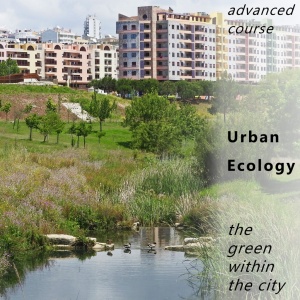Objectives
Context
The continuous urban development associated with the growth of the world population has become one of the most important challenges of the present time. Today, cities accommodate more than 54% of the world’s population, a proportion that is expected to increase to 70% by 2050. Trends in urbanization show that cities are becoming more complex and heterogeneous social-ecological systems, with a growing demand for natural resources mainly for infrastructure, housing, food, water, and energy. These, coupled with generalized environmental degradation and rapid social transformation, pose growing challenges that require an innovative and holistic approach of planning, managing and governing urban areas.
In this context, research is focusing on the role of the urban green infrastructure to deliver the ecosystem services necessary to city-dwellers' well-being. The urban green infrastructure is composed by the network of green spaces, such as public parks, urban forests, allotment gardens, green roofs, derelict lands, and street trees, among other. These green spaces are important for addressing urban sustainability, circularity, and resilience to global changes, as they play an important role to ensure the well-being of human populations.
Objectives
The goal of this course is to provide participants with current and practical knowledge on urban ecology, including its ecological and social aspects. During the course we will view cities as social-ecological systems, analyse urbanization challenges for human and nature, understand the role of urban green infrastructure and nature-based solutions, study how urban agriculture can contribute to the delivery of ecosystem services, use ecological indicators to evaluate the status and trends of the environment, analyse people’s perceptions and knowledge regarding biodiversity and ecosystem services, and achieving circularity of resources. Additionally, participants will gain knowledge of concepts, methods, and tools through the presentation of key findings from recent projects carried out in multiple case studies in European cities.
Participants have to be present at 85% of the contact hours (this means that they can miss one half-day), and actively participate in all activities.
This course can have a recognition of 6 ECTs for FCUL PhD students enrolling in it as part of their first doctoral year. These students need to deliver two reports after the course. For students only requiring 5 ECTs recognized in their specific PhD programmes the last 3.5 hours of the course are not mandatory, they need to deliver only the main report and the certificate will be on'Topics in Urban Ecology’. Such report(s) are also advised for other students requesting creditation of the course in their institutions.
Minimal formation of students: BSc - Bachelor’s degree in Natural / Environmental Sciences, Agricultural / Forestry / Environmental / Civil Engineering or Social Sciences with interest in nature-based solutions and urban green spaces management.
Directed to: MSc or PhD students in Biology, Environmental Sciences, Ecology, Agricultural and Forestry or related areas, postdocs and professionals working in related topics
General Plan
General Plan
- Overview on the theory and concepts beneath Urban Ecology:
- urbanization patterns and environmental impacts
- cities main challenges and the urban green infrastructure
- ecosystem services and nature-based solutions to address urban resilience and sustainability
- environment and people’s health
- functional diversity and traits
- urban agriculture – urban farms and orchards, aquaponics and soilless technologies
- built environment – vertical greening systems and green roofs
- Presentation by local stakeholders, providing the visions and implementation of solutions based in Urban Ecology, followed by field sites visits, to understand in loco que challenges and solutions found.
- Presentations by invited speakers about research projects, to present state of the art knowledge and research being done internationally.
- Presentation and discussion with students regarding key topics for the application of the knowledge obtained, and presentation of the practical work, based on the use of nature-based solution to provide ecosystem services to solve environmental problems.
Funding
Students fees
Partners
n.a.
Fee
Free for 1st year PhD students in Doctoral programmes at FCUL (e.g. Biologia), Biodiversity, Genetics and Evolution (BIODIV UL; UP), Biology and Ecology of Global Changes (BEAG UL, UA) and Sustainability Science (UL, several institutions), when the course counts credits for their formation, in which case the delivery of a final report done after the course is mandatory; the course is also free for more advanced PhD students of the BIODIV programme (ULisboa or UPorto); 50 € for more advanced PhD students of cE3c of other programmes; 80 € for PhD students of the PEERS network (CFE); 125 € for FCUL Master students and unemployed; 180 € for BTI, BI and other PhD students; 250 € for Professional and postdocs.
When the maximum number of students is reached, 10 vacancies will be available for non-paying 1st year PhD students mentioned above, being, by order of preference students from: 1) cE3c; 2) BIODIV (not from cE3c); 3) FCUL (not from cE3c); 4) Sustainability Science (not from cE3c or FCUL); 5) BEAG (not from cE3c or FCUL).
Candidates should fill in the following FORMULARY:
Closed
This formulary is strictly confidential, as explained in the introduction, and the data are required because the cE3c Advanced Courses are also offered as part of the PRR programme of FCUL.
When filling the formulary mind to:
- FILL ALL THE MANDATORY FIELDS
- UPLOAD CV AND MOTIVATION LETTER, both mandatory; use the names as instructed there
- If you want to resume later SAVE the formulary, otherwise you will need to fill everything again
- At the end SUBMIT the formulary before exiting
For any doubts please contact the cE3c coordinator of the cE3c courses Margarida Matos, email mmmatos@fc.ul.pt
ppinho@fc.ul.pt

